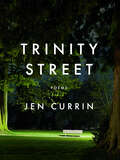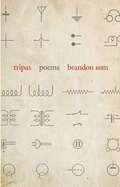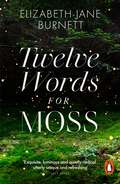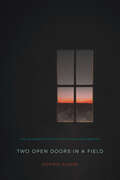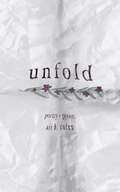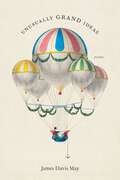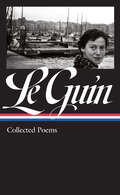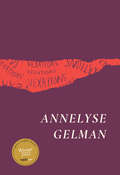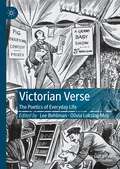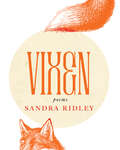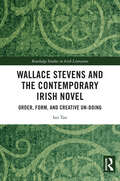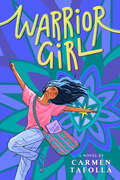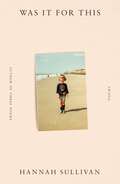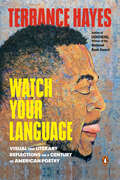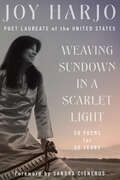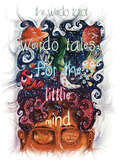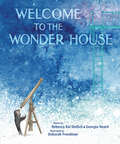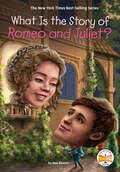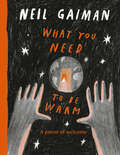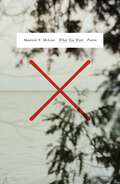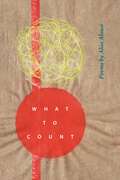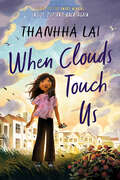- Table View
- List View
Trinity Street: Poems
by Jen CurrinHeartsick, reverent, irreverent, and quietly political, Trinity Street is the much-anticipated fifth collection from poet Jen Currin, winner of the Audre Lorde Award and a Lambda finalist. While Trinity Street is in fact an actual street in Vancouver, it is also the site of an imaginary garden and imperfect utopia in the title poem of this new collection. Currin’s poems weave together the meditative and the disruptive, the queer and quotidian, and the worlds of the dead and the living. Connections are made through prayer and protest; friendships are forged on a planet challenged by climate crisis, collective grief, and the perils of late capitalism. These poems vibrate with unexpected shifts and precise, startling imagery, the touchstones of a poet whose work critics have described as “thrilling,” “emotionally evocative,” and “revelatory.”
Tripas: Poems (Georgia Review Books Ser.)
by Brandon SomWith Tripas, Brandon Som follows up his award-winning debut with a book of poems built out of a multicultural, multigenerational childhood home, in which he celebrates his Chicana grandmother, who worked nights on the assembly line at Motorola, and his Chinese American father and grandparents, who ran the family corner store. Enacting a como se dice poetics, a dialogic poem-making that inventively listens to heritage languages and transcribes family memory, Som participates in a practice of mem(oir), placing each poem's ear toward a confluence of history, labor, and languages, while also enacting a kind of "telephone" between cultures. Invested in the circuitry and circuitous routes of migration and labor, Som's lyricism weaves together the narratives of his transnational communities, bringing to light what is overshadowed in the reckless transit of global capitalism and imagining a world otherwise—one attuned to the echo in the hecho, the oracle in the orale.
Twelve Words for Moss: Love, Loss And Moss
by Elizabeth-Jane BurnettSHORTLISTED FOR THE JHALAK PRIZE 2024Shortlisted for the Wainwright Prize 2023 for Nature Writing'Exquisite, luminous and quietly radical . . . utterly unique and refreshing' Lucy JonesWhere nothing grows, moss is the spark that triggers new life. Embarking on a journey though landscape, memory and recovery, Elizabeth-Jane Burnett explores this mysterious, ancient marvel of the plant world, meditating on and renaming her favourite mosses – from Glowflake to Little Loss – and drawing inspiration from place, people and language itself. 'Fascinating, subtle and risk-taking . . . Poetry, descriptive-evocative prose, memory, memoir, natural history and more all drift and mingle in strikingly new ways' Robert Macfarlane
Two Open Doors in a Field (The Backwaters Prize in Poetry Honorable Mention)
by Sophie KlahrThe poems of Two Open Doors in a Field are constructed through deliberate limitations, restlessly exploring place, desire, and spirituality. A profusion of sonnets rises from a single circumstance: Sophie Klahr&’s experience of driving thousands of miles alone while listening to the radio, where unexpected landscapes make listening to the unexpected more acute. Accompanied by the radio, Klahr&’s experience of land is transformed by listening, and conversely, the body of the radio is sometimes lost to the body of the land. The love story at the core of this work, Klahr&’s bond with Nebraska, becomes the engine of this travelogue. However far the poems range beyond Nebraska, they are tethered to an environment of work and creation, a place of dirt beneath the nails where one can see every star and feel, acutely, the complexity of connection.
Una voz dulce resonó en mi oído
by Rosalía de CastroPoesía Portátil suma a su colección la gran autora de las letras gallegas y precursora de la poesía española moderna: Rosalía de Castro. Rosalía de Castro es, sin duda, una de las voces poéticas más importantes de la lírica española del Romanticismo del siglo XIX. Gran precursora de la modernidad poética, la autora sigue siendo, incluso hoy en día, la viva imagen del espíritu y el alma máter literaria de su Galicia natal. Trabajó por defender las letras gallegas, devolviéndoles la dignidad y el carácter culto de una lengua literaria, y denunció la pobreza rural y la precariedad de su pueblo. Figura clave del rexurdimiento gallego, escribió tanto en su lengua materna –el gallego– como en castellano. Sus versos, cargados de pesimismo pero con una sensibilidad sublime, han inspirado a otros grandes autores como Antonio Machado, Luisa Carnés o Juan Ramón Jiménez. Dicen que antes de morir pidió ver el mar y la crítica apunta que esa era la imagen que tenía Rosalía de Castro de la muerte en sus poemas: la inmensidad del mar en la que descansar. El escritor y traductor Mauro Armiño, Premio Nacional a la Mejor Traducción (1979) por trasladar al castellano la poesía en gallego de Rosalía de Castro, se ha encargado de la antología de esta edición.«No cuidaré ya los rosalesni los palomos que suyos tengo;que sequen, como yo me seco,que mueran, como yo me muero.»
Unfold: Poetry + Prose
by Ari B. CoferFrom the author of paper girl and the knives that made her comes unfold, a poetic, aching, and hopeful retelling of realizations made while on the journey to healing from both loss of love and loss of self.Through poetry and short essays, unfold shows that true growth comes from being unafraid to face what&’s hidden inside, to be vulnerable, and to be unashamed of what we find when we finally open up.
Unusually Grand Ideas: Poems
by James Davis MayTitled after one of the side effects of antidepressants, Unusually Grand Ideas is a poignant account of clinical depression and the complications it introduces to marriage and fatherhood. James Davis May’s poems describe mental illness with nuance, giving a full account of the darkness but also the flashes of hope, love, and even humor that lead toward healing. In pieces ranging from spare lyrical depictions of pain to discursive meditations that argue for hope, May searches for meaning by asking the difficult but important questions that both trouble and sustain us.
Ursula K. Le Guin: Collected Poems (LOA #368)
by Ursula K. Le GuinAt last, a major American poet collected for the first time in the sixth volume of the definitive Library of Edition of her worksIn his last book, Harold Bloom presents the earthy, surprising, and lyrical poetry of Ursula K. Le GuinUrsula K. Le Guin&’s career began and ended with poetry. This sixth volume in the definitive Library of America edition of her works gathers, for the first time, her collected poems—from her earliest collection Wild Angels (1974) through her final publication, the collection So Far So Good, which she delivered to her editor just a week before her death in 2018. The themes explored in the poems gathered here resonate through all Le Guin&’s oeuvre, but find their strongest voice in her poetry: exploration as a metaphor for both human bravery and creativity, the mystery and fragility of nature and the impact of humankind on their environment, the Tao Te Ching, marriage, womanhood, and even cats. Le Guin&’s poetry is often traditional in form but never in style: her verse is earthy, surprising, and lyrical. Including some 40 poems never before collected, this volume restores to print much of Le Guin's remarkable verse. It features a new introduction by editor Harold Bloom, written before his death in 2019, in which he reflects on the power of Le Guin&’s poems, which he calls &“American originals.&” It also features helpful explanatory notes and a chronology of Le Guin&’s life.
Vexations (Phoenix Poets)
by Annelyse GelmanA mother and daughter journey together through a strange speculative world in this experimental book-length poem. Annelyse Gelman’s book-length poem Vexations is a surreal, glitchy meditation on empathy, ecology, and precarity. Throughout the book winds a narrative about a mother and daughter as they move through a world of social and economic collapse in search of a post-capitalist safe haven. All the while, they also navigate a condition that affects the daughter’s empathic abilities, making her vulnerable to emotional contagion. Vexations is titled and structured after Erik Satie’s composition of the same name, a piece that requires patience, endurance, and concentration from both its audience and its players. Similarly, Gelman’s Vexations employs repetition and variation to engage the reader’s attention. Hers is an ambient poetry, drawing on the aesthetic qualities of drone music and sampling voices and sounds to create a lush literary backdrop filled with pulsing psychedelic detail.
Vexations (Phoenix Poets)
by Annelyse GelmanA mother and daughter journey together through a strange speculative world in this experimental book-length poem. Annelyse Gelman’s book-length poem Vexations is a surreal, glitchy meditation on empathy, ecology, and precarity. Throughout the book winds a narrative about a mother and daughter as they move through a world of social and economic collapse in search of a post-capitalist safe haven. All the while, they also navigate a condition that affects the daughter’s empathic abilities, making her vulnerable to emotional contagion. Vexations is titled and structured after Erik Satie’s composition of the same name, a piece that requires patience, endurance, and concentration from both its audience and its players. Similarly, Gelman’s Vexations employs repetition and variation to engage the reader’s attention. Hers is an ambient poetry, drawing on the aesthetic qualities of drone music and sampling voices and sounds to create a lush literary backdrop filled with pulsing psychedelic detail.
Victorian Verse: The Poetics of Everyday Life
by Lee Behlman Olivia Loksing MoyVictorian Verse: The Poetics of Everyday Life casts new light on nineteenth-century poetry by examining the period through its popular verse forms and their surrounding social and media landscape. The volume offers insight into two central concepts of both the Victorian era and our own—status and taste—and how cultural hierarchies then and now were and are constructed and broken. By recovering the lost diversity of Victorian verse, the book maps the breadth of Victorian writing and reading practices, illustrating how these seemingly minor verse genres actually possessed crucial social functions for Victorians, particularly in education, leisure practices, the cultural production of class, and the formation of individual and communal identities. The essays consider how “major” Victorian poets, such as the Pre-Raphaelites, were also committed to writing and reading “minor” verse, further troubling the clear-cut notions of canonicity by examining the contradictions of value.
Vixen
by Sandra RidleyGriffin Poetry Prize finalist Sandra Ridley offers a breathtaking, harrowing immersion in cruelty behind different veils: the medieval hunt, ecological collapse, and intimate partner violence. Sparked by a haunting chance encounter with a fox, and told in six chapters of varying form, Vixen is as visceral as it is mysterious, sensuous as it is terrifying. "Thicket" introduces us to stalking being akin to hunting; the similar threat of terror and—too often—a violent end. "Twitchcraft" locates the hunt in the home, the wild in the domestic, while "Season of the Haunt" explores the unrelenting nature of hunting. "Stricken" asks common questions that often implicitly justify such violence: Is the harassment ‘bad enough’ to allow us to label it criminal? Has all control been taken? Is the fear reasonable? Vixen propels us to examine the nature of empathy, what it means to be a compassionate witness —and what happens when brutality is so ever-present that we become numb. This is a beautiful, difficult, wild tapestry of defiance and survival.
Wallace Stevens and the Contemporary Irish Novel: Order, Form, and Creative Un-Doing (Routledge Studies in Irish Literature)
by Ian TanWallace Stevens and the Contemporary Irish Novel is a major contribution to the study of the literary influence of the American modernist poet Wallace Stevens. Stevens’s lifelong poetic quest for order and the championing of the creative affordances of the imagination finds compelling articulation in the positioning of the Irish novel as a response to larger legacies of Anglo-American modernism, and how aesthetic re-imagining can be possible in the aftermath of the destruction of certainties and literary tradition heralded by postmodern practice and metatextual consciousness. It is this book’s argument that intertextual influences flowing from Stevens’s poetry towards the vitality of the novelistic imagination enact robust dialectical exchanges between existential chaos and artistic order, contemporary form and poetic precursors. Through readings of novels by important contemporary Irish novelists John Banville, Colum McCann, Ed O’Loughlin, Iris Murdoch, and Emma Donoghue, this book contemporizes Stevens’s literary influence with refence to novelistic style, themes, and thematic preoccupations that stake the claim for the international status of the contemporary Irish novel as it shapes a new understanding of “world literature” as exchange between national languages, cultures, and alternative formulations of aesthetic modernity as continuing project.
Warrior Girl
by Carmen TafollaAn insightful novel in verse about the joys and struggles of a Chicana girl who is a warrior for her name, her history, and her right to choose what she celebrates in life.Celina and her family are bilingual and follow both Mexican and American traditions. Celina revels in her Mexican heritage, but once she starts school it feels like the world wants her to erase that part of her identity. Fortunately, she&’s got an army of family and three fabulous new friends behind her to fight the ignorance. But it&’s her Gramma who&’s her biggest inspiration, encouraging Celina to build a shield of joy around herself. Because when you&’re celebrating, when you find a reason to sing or dance or paint or play or laugh or write, they haven&’t taken everything away from you. Of course, it&’s not possible to stay in celebration mode when things get dire--like when her dad&’s deported and a pandemic hits--but if there is anything Celina&’s sure of, it&’s that she&’ll always live up to her last name: Guerrera--woman warrior--and that she will use her voice and writing talents to make the world a more beautiful place where all cultures are celebrated.
Was It for This: Poems
by Hannah SullivanA hybrid new collection from the author of Three Poems—about London, terror, new motherhood, the Grenfell Tower fire, and how we live now.Hannah Sullivan’s first collection, Three Poems, won the T. S. Eliot Prize and the inaugural John Pollard International Poetry Prize. Was It for This continues that book’s project, offering a trenchant exploration of the ways in which we attempt to map our lives in space and time.But there is also the wider, collective experience to contend with, the upheaval of historic event and present disaster. “Tenants,” the first poem, is an elegy for Grenfell, written from the uneasy perspective of a new mother living a few streets away. Elsewhere, from the terraces and precincts of seventies and eighties London to the late-at-night decks of American suburbs, intimately inhabited geographies provide reference points and sites for revisiting.Nothing is too small or unlovely to be transfixed by the poet’s attention, from the thin concrete pillars of a flyover to an elderly peacock’s broken train. There is a memorializing strain in the forensic accumulation of detail, but there is also celebration, a keen sense of holding on to and cherishing what we can.
Watch Your Language: Visual and Literary Reflections on a Century of American Poetry
by Terrance HayesFrom the National Book Award–winning author of Lighthead, Terrance Hayes, a fascinating collection of graphic reviews and illustrated prose addressing the last century of American poetry—to be published simultaneously with his latest poetry collection, So to SpeakCanonized, overlooked, and forgotten African American poets star in Terrance Hayes's brilliant contemplations of personal, canonical, and allegorical literary development. Proceeding from Toni Morrison's aim to expand the landscape of literary imagination in Playing in the Dark ("I want to draw a map, so to speak, of a critical geography"), Watch Your Language charts a lyrical geography of reading and influence in poetry. Illustrated micro-essays, graphic book reviews, biographical prose poems, and nonfiction sketches make reading an imaginative and critical act of watching your language. Hayes has made a kind of poetic guidebook with more questions than answers. "If you don't see suffering's potential as art, will it remain suffering?" he asks in one of the lively mock poetry exam questions of this musing, mercurial collection. Hayes's astonishing drawings and essays literally and figuratively map the acclaimed poet's routes, roots, and wanderings through the landscape of contemporary poetry.
Weaving Sundown in a Scarlet Light: Fifty Poems For Fifty Years
by Joy HarjoA magnificent selection of fifty poems to celebrate three-term US Poet Laureate Joy Harjo’s fifty years as a poet. Over a long, influential career in poetry, Joy Harjo has been praised for her “warm, oracular voice” (John Freeman, Boston Globe) that speaks “from a deep and timeless source of compassion for all” (Craig Morgan Teicher, NPR). Her poems are musical, intimate, political, and wise, intertwining ancestral memory and tribal histories with resilience and love. In this gemlike volume, Harjo selects her best poems from across fifty years, beginning with her early discoveries of her own voice and ending with moving reflections on our contemporary moment. Generous notes on each poem offer insight into Harjo’s inimitable poetics as she takes inspiration from Navajo horse songs and jazz, reckons with home and loss, and listens to the natural messengers of the earth. As evidenced in this transcendent collection, Joy Harjo’s “poetry is light and elixir, the very best prescription for us in wounded times” (Sandra Cisneros, Millions).
Weirdo Tales for the Littlie Mind: A collection of stories that push the boundaries of normal
by The Weirdo Tarotdear reader, i must warn you that the following may entice you to a collection of stories that could leave you feeling curious and even a little odd. in these pages you will meet the part of me that is still a littlie, who often played alone finding solace in the sanctuary of imagination, yet struggled with the desire for a friend. don’t be fooled by the seemingly ordinary plot lines, there is more to these stories than meets the eye. within these pages you will find contentious topics that challenge societal norms, or stories that encourage children to think critically and form their own opinions, all in the hope to provide a neo-pedagogy-of-mutual-child-adult-parenting-experience. while these stories are perfect for littlies who may be eager to explore the weird world of the self, this children’s book is for all. and while the tales may seem strange, they are full of magic, dreamy adventures of self-discovery and journeys of growth, hope and renewal. you’ll learn the joys of decluttering the mind from dull forgettable thoughts. you’ll witness the magic of watching something grow and thrive. you may learn the lesson that true comfort can come in the simplest of forms. the endless, arduous journey to search for true friendship is matched by the raw emotional struggles of our weird and wondrous mind. so if you are brave enough to venture into the world of the weirdo tarot, i invite you to turn the pages and explore the mysterious and peculiar, weirdo tales for the littlie mind. yours weirdly, the weirdo tarot (be weird it’s normal)
Welcome to the Wonder House
by Georgia Heard Rebecca Kai DotlichThis collection of poems, creatively presented in the format of an allegorical house, will engage anyone who has ever wondered &“why?&” as it shows young readers that wonder is everywhere—in yourself and in the world around you.Welcome to the Wonder House, a place to explore the cornerstone of every great thinker—a sense of wonder. This Wonder House has many rooms—one for nature, one for quiet, and one for mystery, among others. Each room is filled with poems and objects covering a wide variety of STEAM topics, including geology, paleontology, physics, astronomy, creative writing, and drawing, that will inspire curiosity in young readers.This enchanting book written by award-winning poets Rebecca Kai Dotlich and Georgia Heard both sparks wonder and shows readers how to kindle it in themselves.
What Is the Story of Romeo and Juliet? (What Is the Story Of?)
by Max Bisantz Who HQWho HQ brings you the stories behind the most well-known characters of our time. Discover the origins of one of literature's most famous couples, Romeo and Juliet, and their creator, William Shakespeare, in this fun and informative addition to the What Is the Story Of? series.In 1597, Shakespeare debuted his newest play, a tragedy about a young Italian couple whose families were sworn enemies. Romeo and Juliet quickly became one of the most famous couples in literary history, and this play became one of Shakespeare's most performed shows. But did you know that much of Romeo and Juliet's story was adapted from tales by other writers? Learn all about how William Shakespeare's dynamic and romantic teenage duo sprouted from the Italian story of The Tragical History of Romeus and Juliet in 1562 and grew into adaptions like West Side Story and even Gnomeo & Juliet in this nonfiction book for young readers.
What You Need to Be Warm
by Neil Gaiman Pam Smy Yuliya Gwilym Nadine Kaadan Daniel EgnéusDuring the coldest season, when the world feels scary—what do you remember about being warm? Baked potatoes. Trust. A kettle on the stove. Blankets. A smile. And, most of all, the reassurance that you belong. <p><p>In his powerful and moving poem, featuring illustrations from thirteen extraordinary artists, bestselling author and UNHCR Goodwill Ambassador Neil Gaiman draws together many different memories to answer the question, what do you need to be warm? <P><P><i>Advisory: Bookshare has learned that this book offers only partial accessibility. We have kept it in the collection because it is useful for some of our members. Benetech is actively working on projects to improve accessibility issues such as these.</i> <p> <b>New York Times Bestseller</b>
What You Want: Poems
by Maureen N. McLaneNational Book Award finalist Maureen N. McLane stuns with a precise, perceptive book of poetic meditations.In her first book of poems since the scintillating More Anon: Selected Poems, Maureen N. McLane offers a bravura, trenchant sounding out of inner and outer weathers. What You Want is a book of core landscapes, mindscapes, and shifting moods. Meditative, lyrical, alert to seasons and pressures on our shared life, McLane registers and shapes an ambient unease. Whether skying with John Constable or walking on wintry paths in our precarious republic, the poet channels what Wordsworth called “moods of my own mind” while she scans for our common horizon. Here are poems filled with gulls and harbors, blinking red lights and empty lobster traps, beach roses and rumored sharks, eels and crows, wind turbines and superhighways. From Sappho to the Luminist painter Fitz Henry Lane, from constellations to microplastics, What You Want is a book alive to the cosmos as well as to our moment, with its many vexations and intermittent illuminations. In poems of powerful command and delicate invitation, moving from swift notations to sustained sequences, this collection sees McLane testing what (if anything) might “outlast the coming heat.” And meanwhile, “There’s no end / to beauty and shit.”
What to Count (Made in Michigan Writers Series)
by Alise AlousiWith heart and insight, the poems in Alise Alousi’s What to Count speak to what it means to come of age as an Iraqi American during the first Gulf War and its continuing aftermath, but also to the joy and complexity of motherhood, daughterhood, and what it means to live a creative life. More than a description of the world, Alousi’s poetry actively lives in and of the world. These poems explore the nuances of memory through the changes wrought by time, conflict, and distance. In "The Ocularist" and "Art," and others, Alousi’s extraordinary verbal deftness precisely locates the still-tender pains and triumphs of collective being while trying to be an individual in the world. What to Count is a remarkable collection of contemporary poetry—both a lyrical splendor and a contemplative account of lineage, silenced history, and identity.
When Clouds Touch Us
by Thanhhà LaiInspired by the author’s own childhood, this stunning novel in verse, sequel to the award-winning #1 bestseller Inside Out and Back Again, picks up two years after Hà and her family arrive in Alabama as refugees from the Việt Nam War.Hà and her family have worked hard to make a life for themselves in the US, but it hasn’t come easy. Hà has only just started to feel settled when Mother decides that the family will move to Texas for a new job. Hà knows how hard starting over is and doesn’t want to have to do it again. But sometimes even an unwanted change can bring opportunity, new friends, and a place to call home. This lyrical and compelling sequel to the National Book Award Medalist and Newbery Honor winning, #1 New York Times bestselling novel Inside Out and Back Again follows Hà and her family through another year of upheaval, growth, and love.
When I Am Gone: Poems for times of loss and grief
by Becky NemsleyA collection of sixty-five poems to help you ride the waves of grief and to provide some comfort and support in the wake of loss. Words written with love to help bring you calm, quiet and a sense of peace at a time that can feel overwhelming. The book is divided into three sections: When you are gone, when they are gone and when I am gone. A reminder to--above all--be gentle with yourself.
